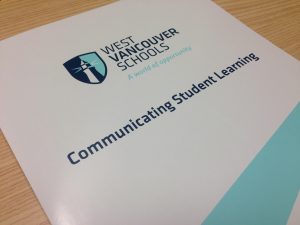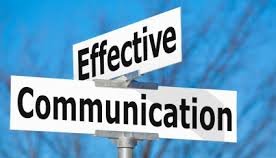Communicating Student Learning: a redesigned way to report on student progress (Guest Blogger Kirsten Dixon, Head Teacher)
November 6, 2016 - 6 minutes readAt École Cedardale, we are at the point in Term 1 where we have just completing our Parent/Teacher conferences. During  these meetings, we take the time to discuss how students may be adjusting to new teachers, new grades, a new school, and possibly, a new language of instruction. Not only do parents want to know how their children are faring academically, they also want to hear how they are doing socially and emotionally; they want to know about the new or renewed friendships their children are establishing. Questions such as, “Who does my child play with outside at recess?” are just as common and relevant as, “How is my child doing in Math?” During the first seven weeks of the school year, the focus is on settling in to the expected structure and routines in daily life at school.
these meetings, we take the time to discuss how students may be adjusting to new teachers, new grades, a new school, and possibly, a new language of instruction. Not only do parents want to know how their children are faring academically, they also want to hear how they are doing socially and emotionally; they want to know about the new or renewed friendships their children are establishing. Questions such as, “Who does my child play with outside at recess?” are just as common and relevant as, “How is my child doing in Math?” During the first seven weeks of the school year, the focus is on settling in to the expected structure and routines in daily life at school.
As many of you might know, this is the first year where the redesigned BC curriculum is being implemented Province-wide from Kindergarten through Grade 9. Although this redesign might be intimidating to some educators, we are fortunate at École Cedardale, as this will be the third year where our staff have worked with the revised curriculum due to requirements during our recent journey towards IB PYP authorization. West Vancouver Schools Superintendent, Chris Kennedy, addressed many of the changes and highlights of the redesigned curriculum during a parent information session in January 2016, and revisited the key points in his Blog Post, Safeway and Soccer Fields (February 2, 2016).
 With a newly redesigned curriculum, it is now time to re-think what reporting on student progress should and could look like. West Vancouver Schools has been very progressive in this aspect. Since 2014, under the guidance of Director of Instruction, Lynne Tomlinson, and District Principal for Early Learning, Sandra-Lynn Shortall, elementary teachers from across the school district have been involved in the planning, design and implementation of a new platform for communicating student learning that has replaced the more traditional report card.
With a newly redesigned curriculum, it is now time to re-think what reporting on student progress should and could look like. West Vancouver Schools has been very progressive in this aspect. Since 2014, under the guidance of Director of Instruction, Lynne Tomlinson, and District Principal for Early Learning, Sandra-Lynn Shortall, elementary teachers from across the school district have been involved in the planning, design and implementation of a new platform for communicating student learning that has replaced the more traditional report card.
The first district Communicating Student Learning (CSL) pilots were implemented with Kindergarten classes during the 2014-2015 school year. In 2015-2016, the pilots were extended to Grades 1, 2, and 4. School and Grade participation was voluntary, however, teachers at École Cedardale jumped at the opportunity to have a voice and share their ideas in the design process. We were provided with numerous release days, which allowed for district-wide collaboration and ensured that the documents and process were streamlined across programs and across the district. For the current 2016-2017 school year, all schools and all elementary grades (K-7) will be using the new CSL templates. In addition to the new design and format, K-7 students will no longer be receiving letter grades. This was an intentional choice, as letter grades often mask and distract from the more meaningful components, feedback and dialogue that takes place within the body of the document. This decision will only be new at École Cedardale to students in Grades 6 and 7, as students in Kindergarten to Grade 5 have not had letter grades in past years.
We are moving away from reporting on what students can or cannot do at the end of each term, which has often be previously linked to a letter grade. Instead, the new reporting document allows us to share an individualized snapshot of the needs of each student at a specific point in their learning journey. Teachers have the ability to comment on student learning in a specific and authentic manner. Curricular Competencies, such as literacy and numeracy skills continue to be paramount, while new emphasis is placed on the Core Competencies, a set of skills required for in-depth and lifelong learning. Meaningful student reflection is embedded within the document, and allows for parents and teachers to experience student voice. Another key feature is the “Ways to support learning” section. Traditionally, the comments included in this section have felt somewhat generic. Under the new format, the suggested ways to support will be more thoughtful and directly catered to that specific student’s needs.
What have been the benefits to student learning thus far? Through discussions with students and parents who have
experienced the new document first hand, it has been expressed that students are better equipped to speak to their learning, as they have been included and involved in their assessment. Students are much more focused on the learning they have experienced, rather than what grade they have received. Parents have voiced that the new reporting document acts as a starting point for further discussion with their children and with the teacher, rather than an end point.
As with all new program implementation, it is expected that there will be a number of questions that come up as students, parents and teachers familiarize themselves with the new reporting format. As a school community, École Cedardale will also be hosting an information session to answer any questions and address any concerns parents may have. Please keep an eye out for further details in an upcoming edition of the Hawks’ Highlights.
